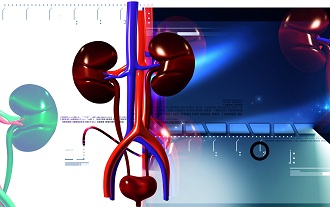Defining biomarkers to spot bladder cancer

Related topics
Health Innovation Health, Demographic Change and Wellbeing France Germany Greece Luxembourg Spain Switzerlanddate: 13/03/2014
Project: Novel MS-based strategies to discover an...
acronym: DeCanbio
See also: CORDIS
Contact: www.decanbio.eu
Identifying biomarkers
In this context, the project aimed in the first phase to perform an extensive discovery study including a genomics approach of bladder cancer tissue samples and a proteomic analysis of urine samples of patients diagnosed with bladder cancer in different stages and the corresponding controls. In addition, extensive literature mining was performed to include the relevant information available for this disease. The combined results of these investigations resulted in an extended list of nearly two hundred candidate proteins that represented the basis of the verification studies performed in Luxembourg.
The Luxembourg Proteomics Clinical Center (LCP) is headed by Bruno Domon. Together with a group of scientists, Professor Domon was intensively involved in the second phase of the project to validate the discovery results for potential routine clinical tests, i.e. to detect proteins differentially expressed in tissue samples. The hypothesis is that such proteins will be shed from the bladder tumour into the urine, and thus detectable in urine samples. Major efforts were devoted to design mass spectrometry based assays to measure peptides representative of the proteins of interest and hence could be used as biomarkers.
Collaboration with the private sector
In brief, the Luxembourg Proteomics Center has developed a platform based on mass spectrometry, an analytical technique that allows precise quantifying of molecules in complex biological samples. The laboratory has built expertise in this field, leveraging recent technology developments, which are based on high-resolution instruments. Through a collaboration with the company ThermoFisher, one of the world leaders in bio-analytics, the centre had early access to these technologies, which has allowed the implementation of clinical applications such as measuring protein biomarkers in urine samples. LCP has a well-established collaboration with ThermoFisher Scientific in Bremen (Germany) and San Jose (USA) with the aim of applying new mass spectrometry techniques to clinical applications.
The European project on bladder cancer has resulted in determining over forty differentially expressed proteins, which have been examined in a study to define a small panel of markers (ideally 5 or 6) that could be used routinely in clinical practice.
This last step is still on-going as is the final assay, and its approval as a diagnostic test needs extensive validation in a large population to assess its specificity and selectivity. Such a study has to be part of a follow-up project to valorise the findings of a pure research programme. However, the practical implementation of clinical tests requires a large-scale study and prior regulatory approval. Such large-scale follow-up projects could typically be conducted in collaboration with industrial partners such as diagnostics companies, or publicly funded EU projects.
